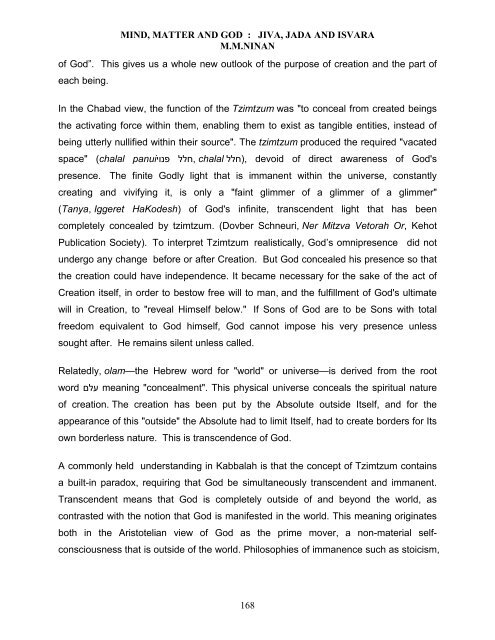Jiva
Create successful ePaper yourself
Turn your PDF publications into a flip-book with our unique Google optimized e-Paper software.
MIND, MATTER AND GOD : JIVA, JADA AND ISVARA<br />
M.M.NINAN<br />
of God”. This gives us a whole new outlook of the purpose of creation and the part of<br />
each being.<br />
In the Chabad view, the function of the Tzimtzum was "to conceal from created beings<br />
the activating force within them, enabling them to exist as tangible entities, instead of<br />
being utterly nullified within their source". The tzimtzum produced the required "vacated<br />
space" (chalal פנויpanui ,חלל chalal ,(חלל devoid of direct awareness of God's<br />
presence. The finite Godly light that is immanent within the universe, constantly<br />
creating and vivifying it, is only a "faint glimmer of a glimmer of a glimmer"<br />
(Tanya, Iggeret HaKodesh) of God's infinite, transcendent light that has been<br />
completely concealed by tzimtzum. (Dovber Schneuri, Ner Mitzva Vetorah Or, Kehot<br />
Publication Society). To interpret Tzimtzum realistically, God’s omnipresence did not<br />
undergo any change before or after Creation. But God concealed his presence so that<br />
the creation could have independence. It became necessary for the sake of the act of<br />
Creation itself, in order to bestow free will to man, and the fulfillment of God's ultimate<br />
will in Creation, to "reveal Himself below." If Sons of God are to be Sons with total<br />
freedom equivalent to God himself, God cannot impose his very presence unless<br />
sought after. He remains silent unless called.<br />
Relatedly, olam—the Hebrew word for "world" or universe—is derived from the root<br />
word עלם meaning "concealment". This physical universe conceals the spiritual nature<br />
of creation. The creation has been put by the Absolute outside Itself, and for the<br />
appearance of this "outside" the Absolute had to limit Itself, had to create borders for Its<br />
own borderless nature. This is transcendence of God.<br />
A commonly held understanding in Kabbalah is that the concept of Tzimtzum contains<br />
a built-in paradox, requiring that God be simultaneously transcendent and immanent.<br />
Transcendent means that God is completely outside of and beyond the world, as<br />
contrasted with the notion that God is manifested in the world. This meaning originates<br />
both in the Aristotelian view of God as the prime mover, a non-material selfconsciousness<br />
that is outside of the world. Philosophies of immanence such as stoicism,<br />
168


















